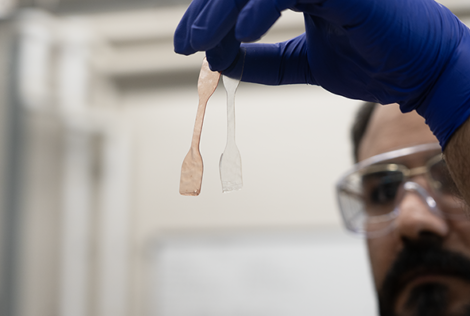
Expertise
Computing in chemical engineering, polymers, fluid mechanics, rheology, molecular simulation, computational fluid dynamics, process modeling
Areas of Specialization
Research Clusters
Current status
-
Accepting graduate students
-
Associate Chair (Graduate)
Chemical Engineering
-
Associate Professor
Chemical Engineering
Overview
Multiscale molecular modelling of polymer materials
Polymer materials are not only ubiquitous in our everyday life, their characteristics — high flexibility, light weight, high manufacturing speed (and low cost), functional ability, etc. — also make them potential solutions to some of the greatest challenges our society faces. Indeed, many new materials designed for applications in energy, the environment and biomedicine involve polymers. Properties of polymer materials are determined not only by the chemical structure of the monomers but also by their configuration and dynamics at the scales of segments and entire chains. To capture these scales, we take a holistic approach and combine fully-resolved atomistic simulation with coarse-grained molecular models. Our goal is to build a bottom-up approach for the molecular design of materials with controlled morphology and targeted properties.
Energy conservation/drag reduction in flow turbulence
When flow in a pipe transitions from the laminar state to turbulence, its friction drag increases abruptly: energy dissipation in turbulent flows is much larger. Regulating flow turbulence for energy conservation is thus of immense technical significance. It has been well established that dissolving a minute amount of polymers can substantially reduce the turbulent friction drag. Despite decades of research, answers to many questions in this area remain elusive. We use high-performance computers to systematically investigate the mechanisms behind experimental observations. Building on this understanding, new approaches will be developed to achieve high-levels of drag reduction without polymer additives.
Dynamics and rheology of polymer liquids
Polymer liquids — solutions and melts — are found in numerous settings including the processing of most polymer materials. When polymer dynamics are coupled with flow motion, many interesting phenomena can occur, understanding of which can be of great practical significance. On the one hand, polymer chains can be strongly deformed by the flow: as a result, conditions of polymer processing can largely determine the structure and properties of the final products. On the other hand, polymers also change the rheological properties of the fluid, which often results in flow behaviours drastically different than what we see in simple Newtonian fluids. Combing our expertise in molecular modelling and complex fluid flow simulation, we investigate polymer fluid behaviours at both small and large scales.
Dr. Li Xi has a broad range of interests in numerical analysis and multiscale computer simulation, with a particular focus on the study of soft matter and complex fluids. He received his Ph.D. in the area of polymer fluid mechanics, under the supervision of Dr. Michael D. Graham at UW-Madison. His thesis research focused on the analysis of nonlinear dynamics in viscoelastic fluid flow using various computational fluid dynamics (CFD) techniques. Specific projects he worked on include flows of polymer solutions at different limits of the Reynolds number, which represent systems from microfluidics to turbulence. After graduation, he was keen to expand his interest in computer simulation to a different area and joined the group of Dr. Bernhardt L. Trout at MIT as a postdoctoral associate. His research there mainly focused on the full-atom molecular simulation of amorphous polymer materials. He was also involved in the development of a continuous manufacturing process for pharmaceutical products. He joined McMaster University in October 2013.
- Postdoctoral, Chemical Engineering, Massachusetts Institute of Technology (Dec 2009-Sep. 2013)
- Ph.D., Chemical Engineering, University of Wisconsin – Madison (2009)
- B.S., Chemical Engineering, Zhejiang University (2004)







